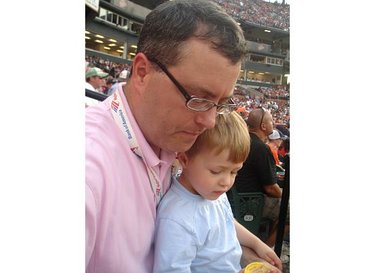Wiles at the bat for Guilderland library
— Photo by Doc Wood
“I have an alter ego,” said Tim Wiles who has recited “Casey at the Bat,” the popular 1888 ballad by Ernest Thayer, all over the country. But Wiles does not have the “haughty grandeur” of his alter ego. According to the president of the library board that hired him, “He doesn’t have a big ego. He’s a team player.”
— Photo by Marie Wiles
Boyhood revisited: Tim Wiles, right, reads with his son, Ben, in the children’s room of the McClure Avenue Branch of the Peoria Public Library, on a recent family visit to Illinois. “This was the branch my mom took me to, beginning at age five — when we moved to Peoria,” said Wiles. “I was thrilled to see that they had my book on ‘Take Me Out to the Ball Game’ at the branch.”
GUILDERLAND — “I’m leaving one dream job for another dream job,” said Tim Wiles, the new director for the Guilderland Public Library.
He has resigned his long-time post as director of research at the Baseball Hall of Fame in Cooperstown to start the new job next week. Wiles moved to Guilderland three-and-a-half years ago when his wife, Marie, became superintendent of the public schools.
He says, even before that, he regarded the library here as “a shining oasis,” making the trek from Cooperstown to the Guilderland library a couple of times each year.
Tim Wiles has always loved books.
He grew up with his brothers in Peoria, Ill., the son of an accountant father — “a numbers guy” — and piano-playing mother who treasured books.
As a kid, his very favorite book was Go, Dog. Go! which ended with a pack of dogs congregating for a party up in a tree. “They were wearing party hats and jumping rope and having fun,” said Wiles, 49, the memory still vivid all these decades later.
Referencing the library’s catch phrase, Wiles added, with a chuckle, “It was a gathering place.” He concluded, ”A book can stick with you,”
Presaging his first dream job, Wiles both played and watched baseball as a kid, although he said he was better at watching. One of his classmates was Joe Girardi, now the manager of the Yankees.
“We were from different neighborhoods but were both invited downtown to one of the 1970s’ gifted schools,” Wiles said.
To illustrate how focused and hardworking Girardi was, Wiles said that he skipped the class trip to an amusement park for the eighth-grade graduates in order to go to baseball practice — “not a game, practice,” stressed Wiles.
Wiles grew up in an early suburb, built in the 1930s, and lived in a house at the corner of Stratford and Avalon streets — “Two great literary traditions,” he said.
In high school, he liked going to the library for “the empty table space,” a respite from his cluttered home.
After starting at Illinois Central, he graduated from the University of Iowa with a bachelor’s degree in English. He focused primarily on contemporary American literature but, having grown up at the intersection of Stratford and Avalon, he enjoyed courses in Shakespeare and Arthurian literature, too.
One course he especially liked, called “In Print, In Person,” was structured so that the students would read a book and then get to work with the author of the book. “We could ask grand questions or, ‘Why is there a comma there?’”
Wiles envisions such discussions taking place at the Guilderland library.
He reads poetry and struggles to name a favorite poet, settling finally on e e cummings but he also likes Robert Frost and Robert Francis — a poet Wiles believes deserves more readers — as well as Edna St. Vincent Millay, William Carlos Williams, and Emily Dickinson.
Wiles says his reading is getting broader as he gets older.
First dream
He graduated from Iowa on a spring Saturday in 1987. The next day, he was at a friend’s place, watching the Cubs’ game on TV and leafing through the latest issue of Sports Illustrated. There, he was arrested by a two-page article about the librarian at the Baseball Hall of Fame. “For relaxation, the Hall’s librarian plays ball,” said the caption under a picture of Tom Heitz wearing an 1850s’ uniform; Heitz had started a vintage ball team.
“On Monday morning, I called Tom…I asked him for a job,” recalled Wiles. “He laughed at me.”
It turned out Heitz had heard from a slew of Sports Illustrated readers and had no job to offer. Wiles was not deterred.
“How can I convince you?” he asked.
“Get a graduate degree in library science,” replied Heitz.
“I said, ‘Great, I’ll do that,” recalled Wiles.
Heitz had offered the same advice to the other callers. No one but Wiles took him up on it. Wiles enrolled in the University at Iowa master’s program and, while earning his degree, kept in touch with Heitz.
Wiles had had a job delivering pizzas and had learned, to get a tip, “If your foot is in the door, they can’t close it,”
He kept his foot in the Hall of Fame door. In 1990, he interned for Heitz and then, since there was still no opening at the Hall of Fame, he worked for four years at the University of Northern Iowa as a humanities reference librarian. During that time, he spent two summers teaching English to faculty, students, and staff at Guangxi University in China.
Late in 1994, his persistence paid off: Wiles was offered the job as the public services librarian at baseball’s Mecca. His mentor was fired after Wiles’s first day, on Jan. 3, 1995, but Wiles was kept on. His title changed to director of research but the work was the same, overseeing a staff that deals with everyone from schoolchildren and baseball fans, to the media.
He described the fun of answering questions and hearing stories from baseballs fans who made the pilgrimage to Cooperstown.
“They would tell the most extraordinary stories,” he said; one was of people separated at birth but reunited through baseball.
Wiles met the woman who would become his wife on Jan. 31, 2005, on a blind date arranged by a mutual friend, and wasted no time proposing — on Nov. 9 of that year. “She said yes…We were married at the Plaque Gallery in the Hall of Fame in front of a Christmas tree on Dec. 19, 2005,” he said.
Wiles had lived in an apartment across from the Hall of Fame. As his wife’s career progressed, his commute grew longer — first 22 miles to Oneonta, then 44 miles to Clinton, and, in 2010, 60 miles to Guilderland.
“We both hope to live in this community a long time,” said Wiles, whose commute will now be just a few miles from their home in Guilderland’s Williamsburg neighborhood to the library.
The one thing he’ll miss from his commute to Cooperstown, said Wiles, is listening to the audio books he checked out from the Guilderland library for the long drives.
“A people person”
The library’s board of trustees is as enthused about hiring Wiles as he is about getting the job. His salary is set at $86,000 annually.
“He’s a people person who genuinely cares about people,” said Christopher Aldrich, the board’s president. “He’s passionate about the role of the public library and its mission to educate, entertain, and inform the citizens of the community.”
After Barbara Nichols Randall, who had been director for 12 years, resigned in August, the board formed a committee to sift through the 15 or 20 applicants who had answered ads posted nationally in July, said Aldrich. The committee was composed of three trustees; a member of the library foundation who is also director of a local college library; two library employees; and the interim director, Margaret Garrett.
Five candidates were interviewed and, while the plan was to have the committee submit two names to the trustees to vote on, only Wiles’s name was put forward. “It was unanimous both on the committee and on the board,” said Aldrich.
He went on to explain the cause for such enthusiasm. Wiles had been a foundation member, serving as a volunteer to support the library and had been the foundation’s president.
“He doesn’t have a big ego. He’s a team player,” said Aldrich. “At the Baseball Hall of Fame, his management style was that of a collaborator….He brings out the best in others and gets employees to work to their strengths….He builds consensus.”
Aldrich went on, “He’s an effective communicator. We want the director out in the community to see how the library can be better and get back responses.
“And he’s a published author, with literary insight.” Wiles co-edited Line Drives: 100 Contemporary Baseball Poems, and, in 2008, he co-authored Baseball’s Greatest Hit: The Story of “Take Me Out to the Ball Game.”
Aldrich concluded, “He’s bright and resourceful. He brings a high level of creativity…We think libraries will have to change a lot over the next season. Tim views problems not as obstacles but as challenges.”
A committee is being put together to serve as a “sounding board” for the new director, said Aldrich. Nichols Randall will serve on that committee along with several trustees.
“She did a good job,” said Aldrich of Nichols Randall. “He’ll be a different kind of director.”
“I want to be all in”
Wiles says that, when he starts work next week, his first goal is to be a listener.
“I value anybody’s perspective on the library, whether unhappy or happy,” he said of public reaction. “Part of my job is to be accessible. I look forward to it.”
Wiles also said, “I want to unite the things I do. When I host an event, I want to be all in.”
Once he’s gotten to know the staff and heard from the community, he’ll be able to lead, Wiles said.
“These days, we live in a cacophony of information,” he said. “Libraries are changing. I want to do whatever the community wants done….I want to help the board and excellent staff pursue new opportunities….It could range from brick and mortar to satellite to downloads…
“The idea we have so much more information available is wonderful. The more information, the more need for information experts to help you navigate.”
One of the attitudes Wiles heard when, in 2012, the public soundly defeated a proposition to about double the size of the library was that “libraries are going away.”
He countered, “They absolutely are not.”
Wiles cited a report released in December by the Pew Research Center that showed 90 percent had a favorable opinion of public libraries; the report said that 90 percent of Americans age 16 and older said that the closing of their public library would have an impact on their community
“Part of my charge,” Wiles said, “is, if you want to read something, to see a movie, or check out the jazz of Louis Armstrong, you don’t have to pay for it; we’ve probably got it.”
The library card, he said, can be described as “a hand-held device that opens a lot of doors.”
He concluded, “Your taxes have paid for it.”





